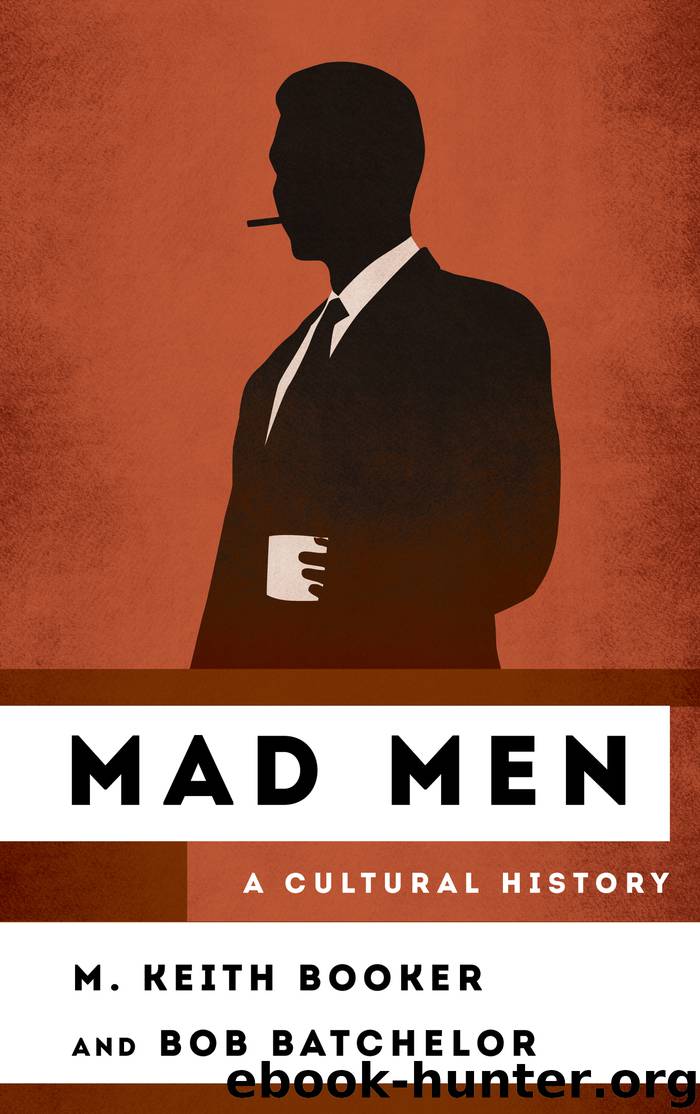Mad Men by M. Keith Booker

Author:M. Keith Booker
Language: eng
Format: epub
Tags: undefined
Publisher: Rowman & Littlefield Publishers
Published: 2012-04-04T04:00:00+00:00
In short, however convenient racism and sexism might have historically been as supports for capitalist exploitation, capitalism as a system can easily accommodate equality on the basis of race and gender because race and gender equality are not structurally incompatible with the workings of a capitalist economy.
Mad Men ultimately makes a similar diagnosis, if more haltingly and in a less theoretically coherent fashion. Among other things, what the series does do, quite effectively, is dramatize the historical evolution of subcultures/countercultures in the United States, thus adding an important piece to the puzzle of just what the 1960s were all about. As M. Keith Booker (2001) has argued, the historical period that we think of as the “1950s” really begins with the reorganization of global economic and political power immediately after World War II and extends at least through the Kennedy assassination near the end of 1963. By this reading, the decade of the “1960s”—with its distinctively remembered rock music, colorfully dressed hippies, and demonstrating college students—does not really begin until 1964, though of course the historical boundary between the 1950s and the 1960s is porous, with considerable overlap. The first three seasons of Mad Men are thus set in what Booker calls the “long 1950s,” and their relationship to the context in which they are set needs to be understood accordingly.
Don Draper, the dashing (but troubled) central figure of Mad Men, is decidedly out of touch with the younger generation of the 1960s. After all, he was born in 1926, while freshmen entering college in 1964 would typically have been born in 1946, making them essentially a generation younger than Draper. What is clear, however, is that what we have here is far more than a failure to communicate based on the famed 1960s generation gap. Born in poverty and reared in lurid lower-class circumstances, the adult Draper is driven by a desire to attain respectability and affirmation by the mainstream culture he could only look at longingly from the outside as a child. As a result, his efforts to be accepted into the mainstream make his relationship with various subcultures and countercultures problematic to say the least. Among the many public allegorical resonances of his private story, then, is a meditation on America’s strained relationship with countercultures in general, suggesting the way in which the national narrative of upward mobility and material success (offering opportunities to industrious immigrants and other outsiders) involves a dark subplot that involves acquiescence and conformism.
The first season episode “Babylon” (Episode 1.6) neatly encapsulates Draper’s strained relationship with the American mainstream. Having taken a new identity in an effort to put his difficult childhood behind him, the talented and hardworking Draper is literally a self-made man, seemingly an embodiment of the American Dream—but it is a very 1950s-style American Dream. Set mostly during the Kennedy-Nixon presidential campaign of 1960, the first season of Mad Men remains very clearly rooted in the 1950s, and Draper (having already achieved considerable success in the professional world of high-stakes
Download
This site does not store any files on its server. We only index and link to content provided by other sites. Please contact the content providers to delete copyright contents if any and email us, we'll remove relevant links or contents immediately.
| Coloring Books for Grown-Ups | Humor |
| Movies | Performing Arts |
| Pop Culture | Puzzles & Games |
| Radio | Sheet Music & Scores |
| Television | Trivia & Fun Facts |
Robin by Dave Itzkoff(2431)
Head of Drama by Sydney Newman(2282)
I'm Judging You by Luvvie Ajayi(2193)
The Paranormal 13 (13 free books featuring witches, vampires, werewolves, mermaids, psychics, Loki, time travel and more!) by unknow(2083)
Ten by Gretchen McNeil(1877)
Single State of Mind by Andi Dorfman(1802)
#MurderTrending by Gretchen McNeil(1654)
Key to the Sacred Pattern: The Untold Story of Rennes-le-Chateau by Henry Lincoln(1621)
Merv by Merv Griffin(1609)
Most Talkative by Andy Cohen(1584)
Notes from the Upside Down by Guy Adams(1465)
This Is Just My Face by Gabourey Sidibe(1457)
The Hunger Games: Official Illustrated Movie Companion by Egan Kate(1424)
Springfield Confidential by Mike Reiss(1408)
Binging with Babish by Andrew Rea(1405)
Jamie Oliver by Stafford Hildred(1380)
The TV Writer's Workbook: A Creative Approach To Television Scripts by Ellen Sandler(1341)
Clarkson--Look Who's Back by Gwen Russell(1334)
Blue Planet II by James Honeyborne & Mark Brownlow(1269)
